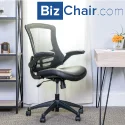Tired of trying to decide between a stool or an office chair? You’re not alone! It can be tough to determine which is the best option for you.
In this article, we’ll compare and contrast the advantages and disadvantages of each, identify key differences between them, understand ergonomic considerations to keep in mind, discuss factors to consider when making a purchase and provide advice on how to make the right decision for your situation.

Stool Vs Office Chair
So if you’re ready to find out which type of chair is best for you—let’s begin with a comparison of the stool vs office chair!
Advantages and Disadvantages of a Stool
Stools offer a unique seating solution that can be used in both the home and office. They take up minimal space, are often low-cost, and come in a variety of heights and styles. However, there are certain disadvantages to using a stool as well.
One major disadvantage is that they don’t typically provide much back support. This can be an issue if you plan on using one for extended periods of time, as it could lead to discomfort or even pain over time.
Additionally, stools usually aren’t adjustable like office chairs, so it may not be possible to find one that fits your body perfectly no matter how hard you try. Lastly, some people find stools orthopedically unfriendly because they require more pressure from your lower body than you’d normally place on it when sitting down in other types of chairs.
Advantages and Disadvantages of an Office Chair
Office chairs provide the most ergonomic seating solution among all types of seating. Their adjustable features—from headrests to lumbar supports—make them perfect for desk jobs where people tend to sit for long periods throughout the day. They also typically come with armrests so that users can have extra support while typing at their desks.
However, office chairs can also have some drawbacks depending on comfort preference and budget constraints. For instance, they often come with high price tags compared to other seating options such as stools or chairs without armrests or back supports. Additionally, if your workspace doesn’t have enough room to accommodate an office chair, then this might not be the best choice for you since they take up more space than stools do.
Lastly, they require regular upkeep; changing basics such as casters and pads every few months can be quite tedious in the long run!
Key Differences Between a Stool and an Office Chair
The key differences between a stool and an office chair boil down to style, functionality, cost-effectiveness, and size requirements:
- Style – Office chairs tend to have more style choices than stools due to their wider range of features (arm rests etc.), whereas stools tend to only come in two common shapes: barstool or countertop stool forms.
- Functionality – Office chairs offer more features than stools (i.e.: adjustment settings), which makes them ideal for longer-term seated use requiring optimal posture or ergonomic comfort since they are designed specifically with these needs in mind; whereas stools lack these benefits which makes them better suited for shorter-term seated use only (i.e.: 10 minutes).
- Cost-effectiveness – Stools are generally cheaper than office chairs due to their lesser features; however if you need an office chair for prolonged daily use then investing in one could help alleviate back strain caused by poor posture over time due to its ergonomic design focusing on proper spinal alignment/support plus adjustable settings tailored to your body type/needs. In comparison, countertop stools tend to only offer minimal padding/comfortability making them less desirable for supporting long-term sitting sessions beyond 15 minutes or so at most depending on individual comfort levels & preferences within this timeframe range too though!
Also worth reading: How Long Do Office Chairs Last? It Might Surprise You
Is it better to sit on a chair or a stool?
The decision between choosing a stool or an ergonomic office chair when you need to sit at work can be difficult, but it’s important to choose the one that best fits your needs. Coming up with a list of pros and cons for each type of chair will help you decide which option is better suited for your specific situation.
Do you stand through the day and sit down only for meetings? If so, then an office chair that provides back and neck support might be the best option for you. Office chairs often have a higher backrest than stools do, which can relieve pressure on the spine and neck by supporting your upper body weight . Some office chairs even come with headrests to provide additional relief.
When it comes to seating, the office chair is the obvious choice. But chairs don’t always provide the best support for your back. Conversely, you’ll find stools in many public spaces but they offer no height adjustment and can be difficult to use over long periods of time.
Is a stool a good office chair?
In an office, a stool is not a good option because of its limitations in terms of what it can offer. It is sometimes not the best seating choice; therefore, it should not be relied upon for proper ergonomic support. However, if you prefer standing desks, then either an ergonomic stool, a standing stool or a kneeling chair may be an option to explore.
Benefits of Using a Stool for Sitting vs an Office Chair
Stools have a few advantages over an office chairs. First, the lower legs are free which allows for greater movement of the feet and leg muscles.
The lower position of the stool may also help keep you a little more aware of your posture while sitting. On the other hand, an ergonomic chair may offer several benefits to people who find them more comfortable in general.
Office chairs are often more comfortable due to their higher backs and arm rests.
The support that an ergonomic chair offers can help keep your back straight and even promote better posture while sitting down. Office chairs also often have a lower weight capacity than stools, making them easier to move around if necessary.
Why are Ergonomic Stools so Uncomfortable?
A modernized stool is more ergonomic than ever before, but it’s difficult to find one that gives both back support and lower back comfort at the same time.
Identifying a stool that offers both types of comfort can be a challenge because when you recline on a comfortable chair, it’s natural for your spine to curve forward too much. However, if you choose a less-padded option with minimal lumbar support, getting out of an empty seat may prove difficult without keeling over backward.
New solutions are often created by people who experience specific injuries or discomfort in their backs which translate into design features of new stools. If someone prefers low seating because it’s easier for them to get up from stiff knees this could be reflected in the design of their stool. If someone has experienced back pains after long hours on their feet, they can modify their own stools to improve circulation and support.
Ergonomic Chair Our Top Picks
Active sitting for long periods of time does tend to bring on back pain in most office workers. The best chairs to get for your office work are the ergonomic and task chairs as they have the features to keep you comfortable for long hours.
A ergonomic office chair with lumbar support will help with good posture while doing any kind of office work. The best ergonomic chair is especially important for office furniture. An active sitting chair might have optional armrests, adjustable height and head support makes for better health benefits during prolonged sitting.
Ergonomic and Saddle Stools for Your Office Space
A list top ergonomic stool choices to promote proper posture and takes up less floor space than typical office chairs.
Conclusion
Make a decision between the two based on a number of criteria, including comfort, the amount of time you plan to use it, and armrests.
Choose a stool if you’re going to be sitting for a short period of time or your work involves frequent movement such as in an art studio and nearby office area. For longer hours, we recommend a chair with the same features.
No matter which piece you settle on, make sure to maintain a healthy work routine by standing up for at least one hour per day.
Also Read: How do I keep my chair wheels from rolling? A Simple Guide
Also Read: How to Avoid Office Chair Cutting Off Circulation in Legs
Also Read: Best green screen backgrounds for chroma key photography and streaming
Also worth reading: How much do office chairs cost? 7 Key factors
Also worth reading: Best Office L Shaped Desk For Your Home
Also worth reading: Office Desk Vs Gaming Desk – What Are The Differences
















